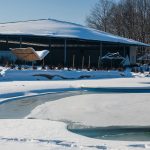Winter is Coming!
|
Winter is Coming
Although your pool may remain unused this winter, you definitely do not want to neglect it. Many people think that winterizing a pool just means throwing a pool cover or tarp on it. Others don’t do anything at all. There are many steps that go into winterizing your pool that you need to know.
Pumps, filters, and heaters, Oh My!
Your pool equipment needs to be prepared to endure the winter season. All equipment needs to be drained of all water. Drain plugs need to be removed. All debris and cobwebs should be removed. Power should be shut down to the system. Timer pins removed and breakers shut off. You can also use a rust repellent material on metal components. If possible, you can remove and store as much as possible indoors. These steps will help prevent against freeze/thaw damage, rodent infestation, and vandalism.
|
|
Oh, (Cold) Snap!
Although the pool is closed, you still need to address the pool water. When the pool is closed, you want to add chlorine, keep the pH on the higher side, and consider adding an algaecide. All these will help to eliminate the possibility of algae growing over the winter. You also need to monitor the water level. When the pool is closed, the water level needs to be dropped to the skimmer. The lines need to be blown out of all water, a pool approved antifreeze added to the lines, and the lines plugged to prevent from freeze/thaw damage. Also, a protective device needs to be installed in the skimmer. Over the winter, you want to maintain proper water levels to ensure water does not get into any lines or behind tiles. If water levels get too low due to an unknown leak, it can cause damage to pool covers and void their warranties.
|
|
Walking on Thin Ice
Properly and securely covering your pool will help to prolong the life of the pool surface. Having the pool covered over the winter will prevent debris from getting in the pool and staining the surface. A securely covered pool will also serve as protection for anyone, or anything that may come across your pool over the winter. Safety covers need to be properly and securely installed by a professional. You want to ensure that you have the correct anchors for your type of decking whether it is concrete, pavers, or wood. Some elect to use a tarp for a pool cover which is not recommended. During a bad storm, that tarp and all the debris on top of it usually gets blown into the pool making a mess inside the pool. Also, the tarp should not be considered a safety feature as anyone, or anything that comes in contact with it will cause the tarp and possibly themselves to fall into the pool.
Snowed Under
Don’t let your pool get the better of you this winter. Ensure that you have the pool closed prior to the first frost to help eliminate potential problems. A successful pool winterization starts now, before winter is here.
|
Recent Posts





